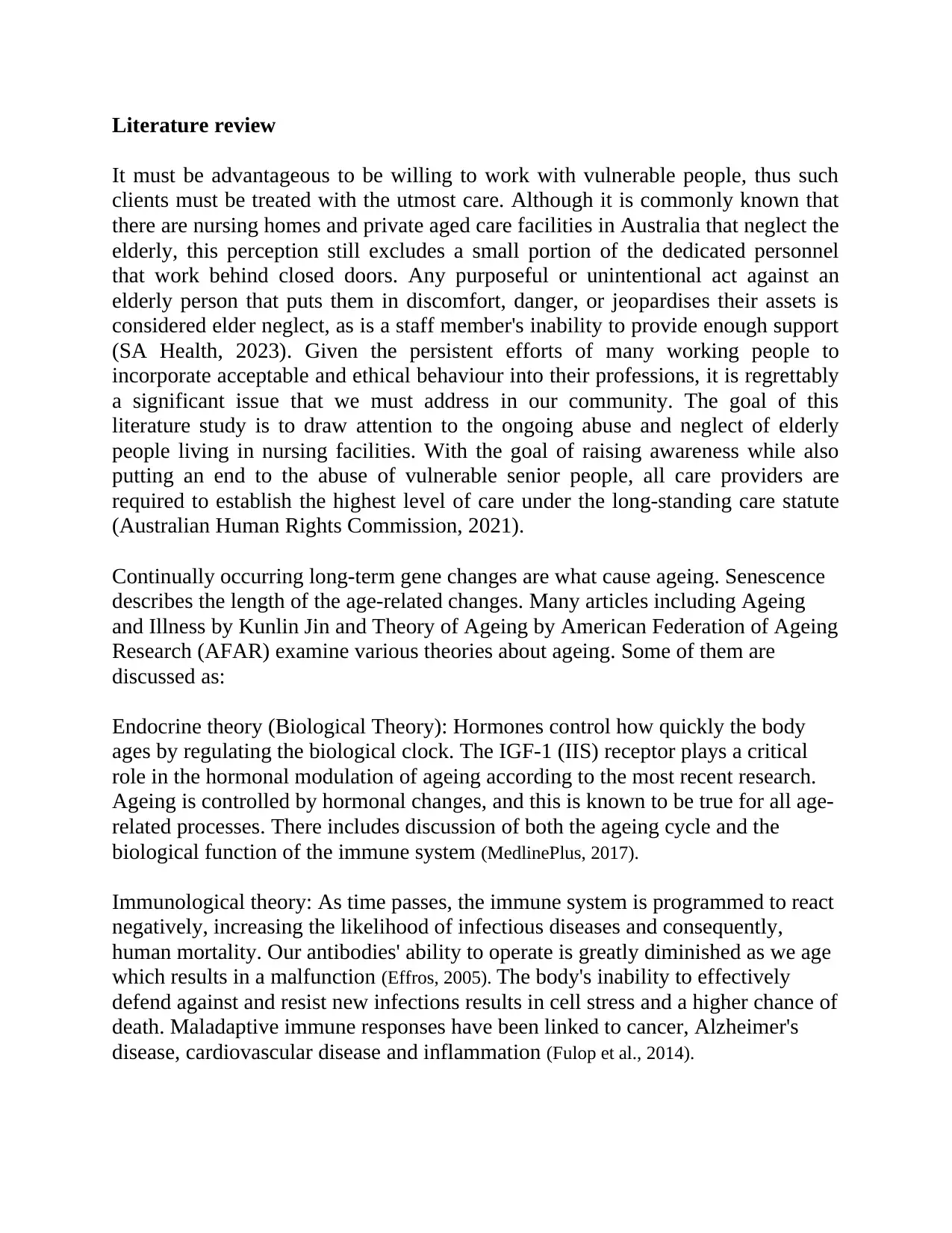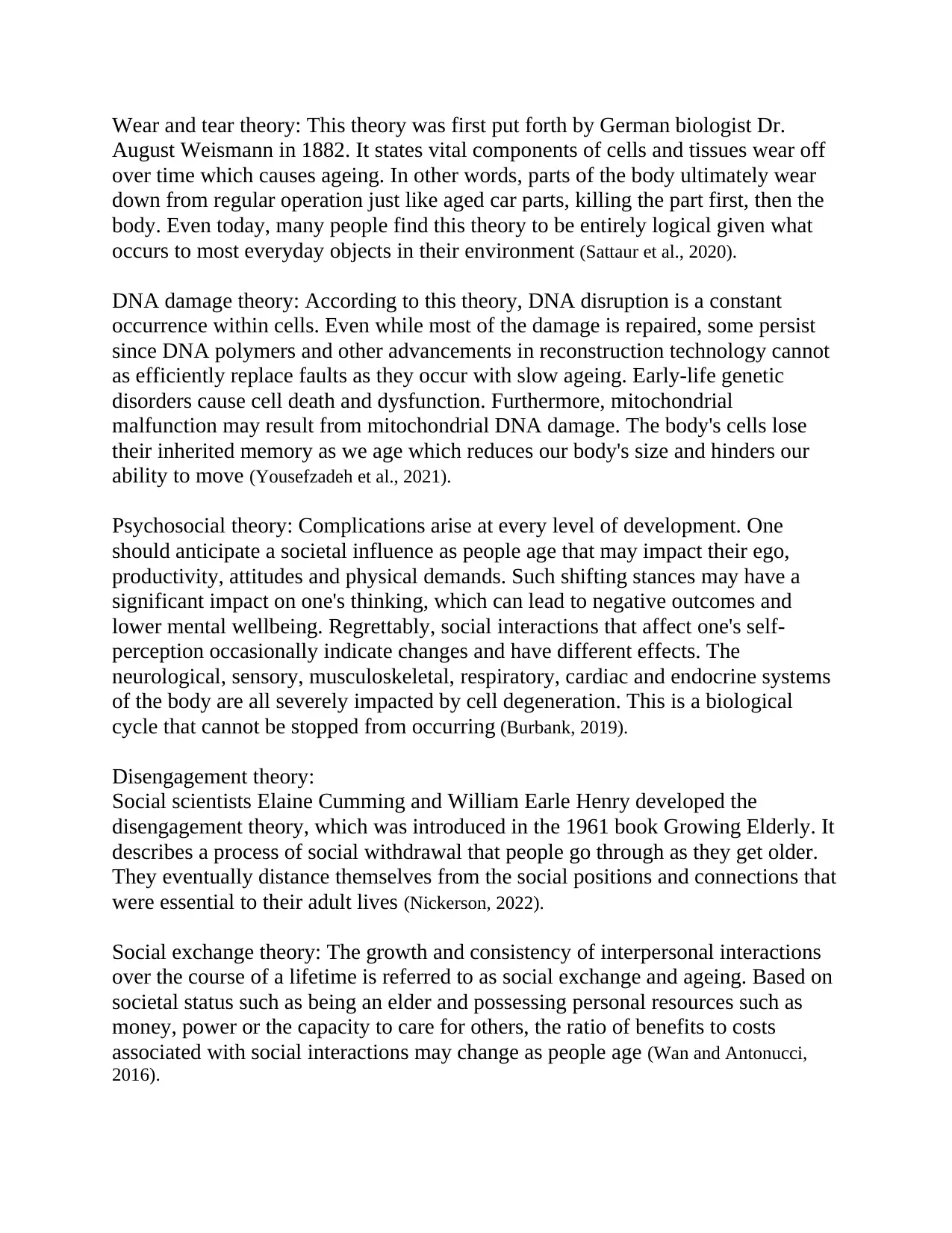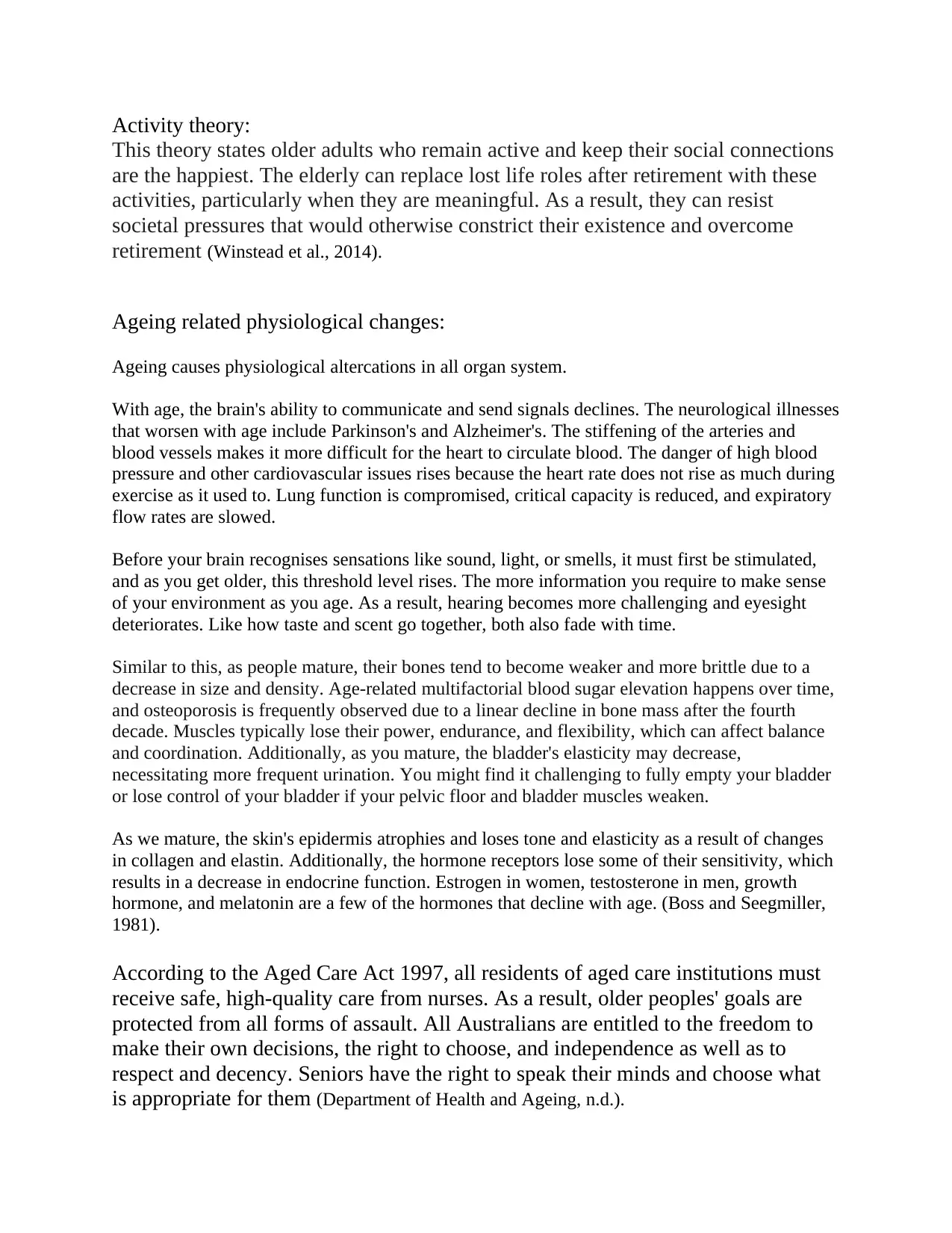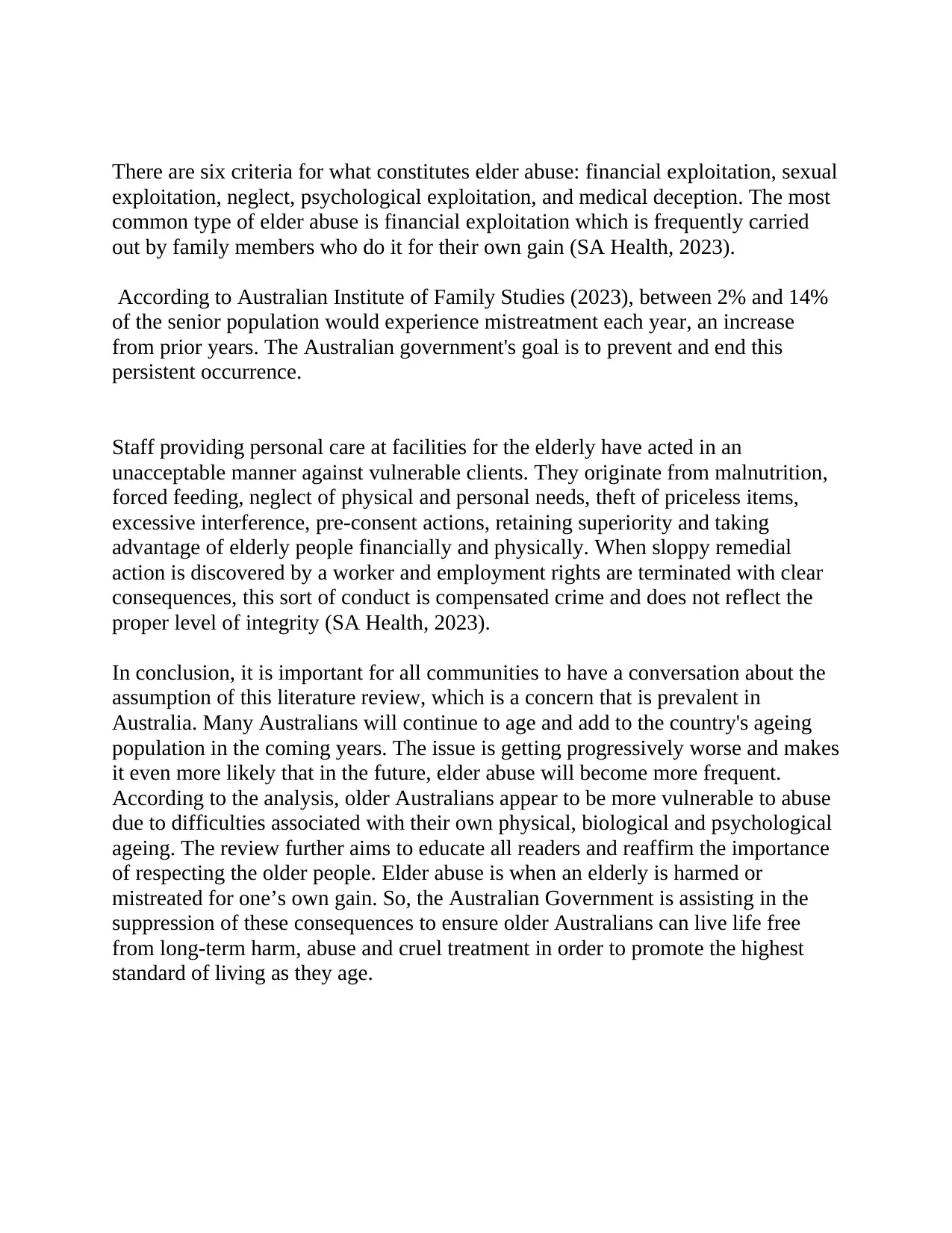Review of Literature: Addressing Elder Abuse in Aged Care Facilities
VerifiedAdded on 2023/06/07
|4
|1804
|477
Literature Review
AI Summary
This literature review addresses the critical issue of elder abuse and neglect within Australian nursing facilities. It highlights the various theories of aging, including endocrine, immunological, wear and tear, DNA damage, and psychosocial theories, alongside physiological changes associated with aging that make older individuals more vulnerable. The review examines different psychosocial theories such as disengagement, social exchange, and activity theory. It also emphasizes the legal framework, particularly the Aged Care Act 1997, which mandates safe and high-quality care for aged care residents. Different forms of elder abuse, including financial, sexual, psychological, and medical exploitation, are discussed, with financial exploitation being the most prevalent. The review concludes by stressing the importance of community awareness and the need for proactive measures by the Australian government to prevent and address elder abuse, ensuring a higher standard of living for older Australians free from harm and mistreatment. Desklib provides access to this and other solved assignments.

Literature review
It must be advantageous to be willing to work with vulnerable people, thus such
clients must be treated with the utmost care. Although it is commonly known that
there are nursing homes and private aged care facilities in Australia that neglect the
elderly, this perception still excludes a small portion of the dedicated personnel
that work behind closed doors. Any purposeful or unintentional act against an
elderly person that puts them in discomfort, danger, or jeopardises their assets is
considered elder neglect, as is a staff member's inability to provide enough support
(SA Health, 2023). Given the persistent efforts of many working people to
incorporate acceptable and ethical behaviour into their professions, it is regrettably
a significant issue that we must address in our community. The goal of this
literature study is to draw attention to the ongoing abuse and neglect of elderly
people living in nursing facilities. With the goal of raising awareness while also
putting an end to the abuse of vulnerable senior people, all care providers are
required to establish the highest level of care under the long-standing care statute
(Australian Human Rights Commission, 2021).
Continually occurring long-term gene changes are what cause ageing. Senescence
describes the length of the age-related changes. Many articles including Ageing
and Illness by Kunlin Jin and Theory of Ageing by American Federation of Ageing
Research (AFAR) examine various theories about ageing. Some of them are
discussed as:
Endocrine theory (Biological Theory): Hormones control how quickly the body
ages by regulating the biological clock. The IGF-1 (IIS) receptor plays a critical
role in the hormonal modulation of ageing according to the most recent research.
Ageing is controlled by hormonal changes, and this is known to be true for all age-
related processes. There includes discussion of both the ageing cycle and the
biological function of the immune system (MedlinePlus, 2017).
Immunological theory: As time passes, the immune system is programmed to react
negatively, increasing the likelihood of infectious diseases and consequently,
human mortality. Our antibodies' ability to operate is greatly diminished as we age
which results in a malfunction (Effros, 2005). The body's inability to effectively
defend against and resist new infections results in cell stress and a higher chance of
death. Maladaptive immune responses have been linked to cancer, Alzheimer's
disease, cardiovascular disease and inflammation (Fulop et al., 2014).
It must be advantageous to be willing to work with vulnerable people, thus such
clients must be treated with the utmost care. Although it is commonly known that
there are nursing homes and private aged care facilities in Australia that neglect the
elderly, this perception still excludes a small portion of the dedicated personnel
that work behind closed doors. Any purposeful or unintentional act against an
elderly person that puts them in discomfort, danger, or jeopardises their assets is
considered elder neglect, as is a staff member's inability to provide enough support
(SA Health, 2023). Given the persistent efforts of many working people to
incorporate acceptable and ethical behaviour into their professions, it is regrettably
a significant issue that we must address in our community. The goal of this
literature study is to draw attention to the ongoing abuse and neglect of elderly
people living in nursing facilities. With the goal of raising awareness while also
putting an end to the abuse of vulnerable senior people, all care providers are
required to establish the highest level of care under the long-standing care statute
(Australian Human Rights Commission, 2021).
Continually occurring long-term gene changes are what cause ageing. Senescence
describes the length of the age-related changes. Many articles including Ageing
and Illness by Kunlin Jin and Theory of Ageing by American Federation of Ageing
Research (AFAR) examine various theories about ageing. Some of them are
discussed as:
Endocrine theory (Biological Theory): Hormones control how quickly the body
ages by regulating the biological clock. The IGF-1 (IIS) receptor plays a critical
role in the hormonal modulation of ageing according to the most recent research.
Ageing is controlled by hormonal changes, and this is known to be true for all age-
related processes. There includes discussion of both the ageing cycle and the
biological function of the immune system (MedlinePlus, 2017).
Immunological theory: As time passes, the immune system is programmed to react
negatively, increasing the likelihood of infectious diseases and consequently,
human mortality. Our antibodies' ability to operate is greatly diminished as we age
which results in a malfunction (Effros, 2005). The body's inability to effectively
defend against and resist new infections results in cell stress and a higher chance of
death. Maladaptive immune responses have been linked to cancer, Alzheimer's
disease, cardiovascular disease and inflammation (Fulop et al., 2014).
Paraphrase This Document
Need a fresh take? Get an instant paraphrase of this document with our AI Paraphraser

Wear and tear theory: This theory was first put forth by German biologist Dr.
August Weismann in 1882. It states vital components of cells and tissues wear off
over time which causes ageing. In other words, parts of the body ultimately wear
down from regular operation just like aged car parts, killing the part first, then the
body. Even today, many people find this theory to be entirely logical given what
occurs to most everyday objects in their environment (Sattaur et al., 2020).
DNA damage theory: According to this theory, DNA disruption is a constant
occurrence within cells. Even while most of the damage is repaired, some persist
since DNA polymers and other advancements in reconstruction technology cannot
as efficiently replace faults as they occur with slow ageing. Early-life genetic
disorders cause cell death and dysfunction. Furthermore, mitochondrial
malfunction may result from mitochondrial DNA damage. The body's cells lose
their inherited memory as we age which reduces our body's size and hinders our
ability to move (Yousefzadeh et al., 2021).
Psychosocial theory: Complications arise at every level of development. One
should anticipate a societal influence as people age that may impact their ego,
productivity, attitudes and physical demands. Such shifting stances may have a
significant impact on one's thinking, which can lead to negative outcomes and
lower mental wellbeing. Regrettably, social interactions that affect one's self-
perception occasionally indicate changes and have different effects. The
neurological, sensory, musculoskeletal, respiratory, cardiac and endocrine systems
of the body are all severely impacted by cell degeneration. This is a biological
cycle that cannot be stopped from occurring (Burbank, 2019).
Disengagement theory:
Social scientists Elaine Cumming and William Earle Henry developed the
disengagement theory, which was introduced in the 1961 book Growing Elderly. It
describes a process of social withdrawal that people go through as they get older.
They eventually distance themselves from the social positions and connections that
were essential to their adult lives (Nickerson, 2022).
Social exchange theory: The growth and consistency of interpersonal interactions
over the course of a lifetime is referred to as social exchange and ageing. Based on
societal status such as being an elder and possessing personal resources such as
money, power or the capacity to care for others, the ratio of benefits to costs
associated with social interactions may change as people age (Wan and Antonucci,
2016).
August Weismann in 1882. It states vital components of cells and tissues wear off
over time which causes ageing. In other words, parts of the body ultimately wear
down from regular operation just like aged car parts, killing the part first, then the
body. Even today, many people find this theory to be entirely logical given what
occurs to most everyday objects in their environment (Sattaur et al., 2020).
DNA damage theory: According to this theory, DNA disruption is a constant
occurrence within cells. Even while most of the damage is repaired, some persist
since DNA polymers and other advancements in reconstruction technology cannot
as efficiently replace faults as they occur with slow ageing. Early-life genetic
disorders cause cell death and dysfunction. Furthermore, mitochondrial
malfunction may result from mitochondrial DNA damage. The body's cells lose
their inherited memory as we age which reduces our body's size and hinders our
ability to move (Yousefzadeh et al., 2021).
Psychosocial theory: Complications arise at every level of development. One
should anticipate a societal influence as people age that may impact their ego,
productivity, attitudes and physical demands. Such shifting stances may have a
significant impact on one's thinking, which can lead to negative outcomes and
lower mental wellbeing. Regrettably, social interactions that affect one's self-
perception occasionally indicate changes and have different effects. The
neurological, sensory, musculoskeletal, respiratory, cardiac and endocrine systems
of the body are all severely impacted by cell degeneration. This is a biological
cycle that cannot be stopped from occurring (Burbank, 2019).
Disengagement theory:
Social scientists Elaine Cumming and William Earle Henry developed the
disengagement theory, which was introduced in the 1961 book Growing Elderly. It
describes a process of social withdrawal that people go through as they get older.
They eventually distance themselves from the social positions and connections that
were essential to their adult lives (Nickerson, 2022).
Social exchange theory: The growth and consistency of interpersonal interactions
over the course of a lifetime is referred to as social exchange and ageing. Based on
societal status such as being an elder and possessing personal resources such as
money, power or the capacity to care for others, the ratio of benefits to costs
associated with social interactions may change as people age (Wan and Antonucci,
2016).

Activity theory:
This theory states older adults who remain active and keep their social connections
are the happiest. The elderly can replace lost life roles after retirement with these
activities, particularly when they are meaningful. As a result, they can resist
societal pressures that would otherwise constrict their existence and overcome
retirement (Winstead et al., 2014).
Ageing related physiological changes:
Ageing causes physiological altercations in all organ system.
With age, the brain's ability to communicate and send signals declines. The neurological illnesses
that worsen with age include Parkinson's and Alzheimer's. The stiffening of the arteries and
blood vessels makes it more difficult for the heart to circulate blood. The danger of high blood
pressure and other cardiovascular issues rises because the heart rate does not rise as much during
exercise as it used to. Lung function is compromised, critical capacity is reduced, and expiratory
flow rates are slowed.
Before your brain recognises sensations like sound, light, or smells, it must first be stimulated,
and as you get older, this threshold level rises. The more information you require to make sense
of your environment as you age. As a result, hearing becomes more challenging and eyesight
deteriorates. Like how taste and scent go together, both also fade with time.
Similar to this, as people mature, their bones tend to become weaker and more brittle due to a
decrease in size and density. Age-related multifactorial blood sugar elevation happens over time,
and osteoporosis is frequently observed due to a linear decline in bone mass after the fourth
decade. Muscles typically lose their power, endurance, and flexibility, which can affect balance
and coordination. Additionally, as you mature, the bladder's elasticity may decrease,
necessitating more frequent urination. You might find it challenging to fully empty your bladder
or lose control of your bladder if your pelvic floor and bladder muscles weaken.
As we mature, the skin's epidermis atrophies and loses tone and elasticity as a result of changes
in collagen and elastin. Additionally, the hormone receptors lose some of their sensitivity, which
results in a decrease in endocrine function. Estrogen in women, testosterone in men, growth
hormone, and melatonin are a few of the hormones that decline with age. (Boss and Seegmiller,
1981).
According to the Aged Care Act 1997, all residents of aged care institutions must
receive safe, high-quality care from nurses. As a result, older peoples' goals are
protected from all forms of assault. All Australians are entitled to the freedom to
make their own decisions, the right to choose, and independence as well as to
respect and decency. Seniors have the right to speak their minds and choose what
is appropriate for them (Department of Health and Ageing, n.d.).
This theory states older adults who remain active and keep their social connections
are the happiest. The elderly can replace lost life roles after retirement with these
activities, particularly when they are meaningful. As a result, they can resist
societal pressures that would otherwise constrict their existence and overcome
retirement (Winstead et al., 2014).
Ageing related physiological changes:
Ageing causes physiological altercations in all organ system.
With age, the brain's ability to communicate and send signals declines. The neurological illnesses
that worsen with age include Parkinson's and Alzheimer's. The stiffening of the arteries and
blood vessels makes it more difficult for the heart to circulate blood. The danger of high blood
pressure and other cardiovascular issues rises because the heart rate does not rise as much during
exercise as it used to. Lung function is compromised, critical capacity is reduced, and expiratory
flow rates are slowed.
Before your brain recognises sensations like sound, light, or smells, it must first be stimulated,
and as you get older, this threshold level rises. The more information you require to make sense
of your environment as you age. As a result, hearing becomes more challenging and eyesight
deteriorates. Like how taste and scent go together, both also fade with time.
Similar to this, as people mature, their bones tend to become weaker and more brittle due to a
decrease in size and density. Age-related multifactorial blood sugar elevation happens over time,
and osteoporosis is frequently observed due to a linear decline in bone mass after the fourth
decade. Muscles typically lose their power, endurance, and flexibility, which can affect balance
and coordination. Additionally, as you mature, the bladder's elasticity may decrease,
necessitating more frequent urination. You might find it challenging to fully empty your bladder
or lose control of your bladder if your pelvic floor and bladder muscles weaken.
As we mature, the skin's epidermis atrophies and loses tone and elasticity as a result of changes
in collagen and elastin. Additionally, the hormone receptors lose some of their sensitivity, which
results in a decrease in endocrine function. Estrogen in women, testosterone in men, growth
hormone, and melatonin are a few of the hormones that decline with age. (Boss and Seegmiller,
1981).
According to the Aged Care Act 1997, all residents of aged care institutions must
receive safe, high-quality care from nurses. As a result, older peoples' goals are
protected from all forms of assault. All Australians are entitled to the freedom to
make their own decisions, the right to choose, and independence as well as to
respect and decency. Seniors have the right to speak their minds and choose what
is appropriate for them (Department of Health and Ageing, n.d.).
⊘ This is a preview!⊘
Do you want full access?
Subscribe today to unlock all pages.

Trusted by 1+ million students worldwide

There are six criteria for what constitutes elder abuse: financial exploitation, sexual
exploitation, neglect, psychological exploitation, and medical deception. The most
common type of elder abuse is financial exploitation which is frequently carried
out by family members who do it for their own gain (SA Health, 2023).
According to Australian Institute of Family Studies (2023), between 2% and 14%
of the senior population would experience mistreatment each year, an increase
from prior years. The Australian government's goal is to prevent and end this
persistent occurrence.
Staff providing personal care at facilities for the elderly have acted in an
unacceptable manner against vulnerable clients. They originate from malnutrition,
forced feeding, neglect of physical and personal needs, theft of priceless items,
excessive interference, pre-consent actions, retaining superiority and taking
advantage of elderly people financially and physically. When sloppy remedial
action is discovered by a worker and employment rights are terminated with clear
consequences, this sort of conduct is compensated crime and does not reflect the
proper level of integrity (SA Health, 2023).
In conclusion, it is important for all communities to have a conversation about the
assumption of this literature review, which is a concern that is prevalent in
Australia. Many Australians will continue to age and add to the country's ageing
population in the coming years. The issue is getting progressively worse and makes
it even more likely that in the future, elder abuse will become more frequent.
According to the analysis, older Australians appear to be more vulnerable to abuse
due to difficulties associated with their own physical, biological and psychological
ageing. The review further aims to educate all readers and reaffirm the importance
of respecting the older people. Elder abuse is when an elderly is harmed or
mistreated for one’s own gain. So, the Australian Government is assisting in the
suppression of these consequences to ensure older Australians can live life free
from long-term harm, abuse and cruel treatment in order to promote the highest
standard of living as they age.
exploitation, neglect, psychological exploitation, and medical deception. The most
common type of elder abuse is financial exploitation which is frequently carried
out by family members who do it for their own gain (SA Health, 2023).
According to Australian Institute of Family Studies (2023), between 2% and 14%
of the senior population would experience mistreatment each year, an increase
from prior years. The Australian government's goal is to prevent and end this
persistent occurrence.
Staff providing personal care at facilities for the elderly have acted in an
unacceptable manner against vulnerable clients. They originate from malnutrition,
forced feeding, neglect of physical and personal needs, theft of priceless items,
excessive interference, pre-consent actions, retaining superiority and taking
advantage of elderly people financially and physically. When sloppy remedial
action is discovered by a worker and employment rights are terminated with clear
consequences, this sort of conduct is compensated crime and does not reflect the
proper level of integrity (SA Health, 2023).
In conclusion, it is important for all communities to have a conversation about the
assumption of this literature review, which is a concern that is prevalent in
Australia. Many Australians will continue to age and add to the country's ageing
population in the coming years. The issue is getting progressively worse and makes
it even more likely that in the future, elder abuse will become more frequent.
According to the analysis, older Australians appear to be more vulnerable to abuse
due to difficulties associated with their own physical, biological and psychological
ageing. The review further aims to educate all readers and reaffirm the importance
of respecting the older people. Elder abuse is when an elderly is harmed or
mistreated for one’s own gain. So, the Australian Government is assisting in the
suppression of these consequences to ensure older Australians can live life free
from long-term harm, abuse and cruel treatment in order to promote the highest
standard of living as they age.
1 out of 4
Your All-in-One AI-Powered Toolkit for Academic Success.
+13062052269
info@desklib.com
Available 24*7 on WhatsApp / Email
![[object Object]](/_next/static/media/star-bottom.7253800d.svg)
Unlock your academic potential
Copyright © 2020–2026 A2Z Services. All Rights Reserved. Developed and managed by ZUCOL.


